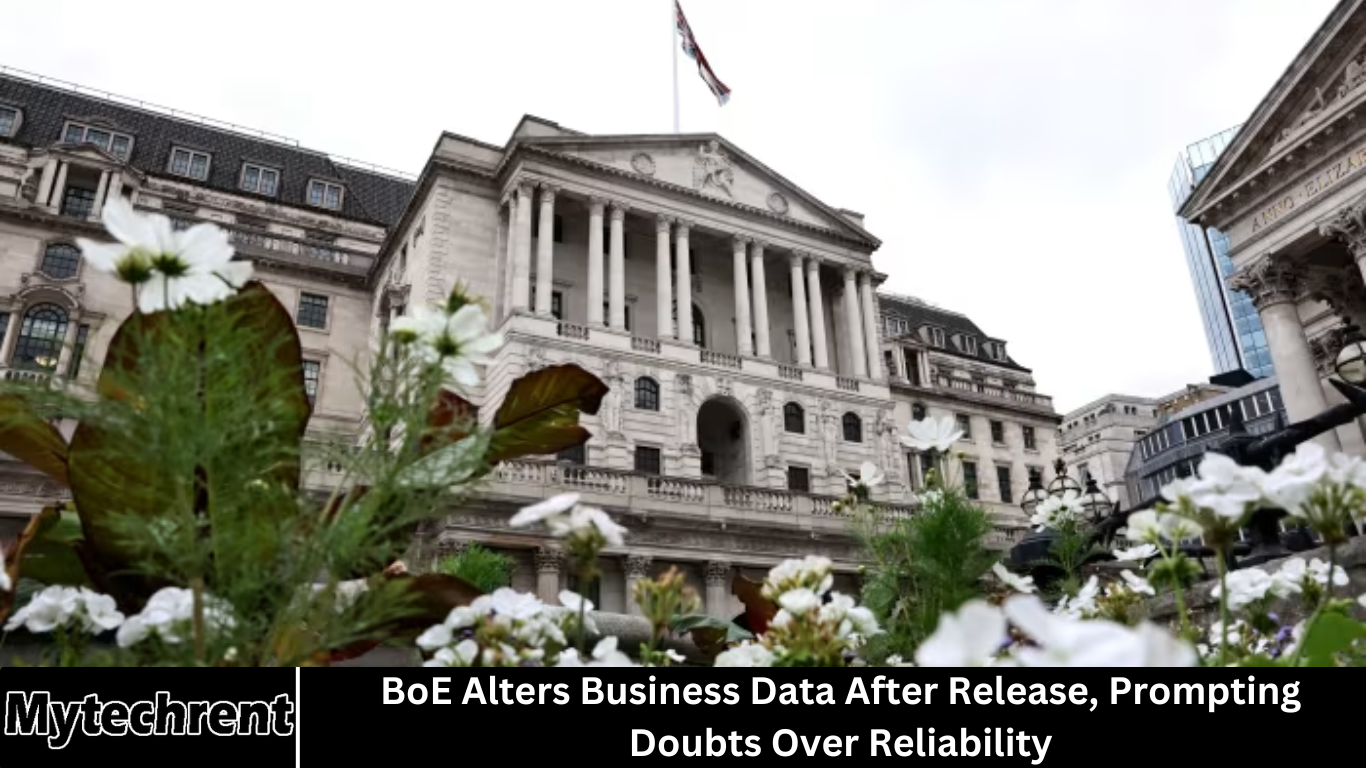The Bank of England (BoE), the UK’s central bank and a pillar of financial authority, has recently come under scrutiny after altering key business data post-publication.
- What Happened: The BoE’s Business Data Revision
- Key Areas of Data Affected
- Why Does This Matter? The Importance of Reliable Economic Data
- Expert Reactions and Economic Commentary
- Has This Happened Before? A Look at BoE’s Track Record
- BoE’s Response to the Controversy
- Implications for Future Economic Reporting
- What This Means for Markets
- Political Repercussions
- Frequently Asked Question
- What data did the Bank of England change after publication?
- Why is altering economic data after release considered a problem?
- How often does the BoE revise its published data?
- How does this impact interest rate decisions by the Bank of England?
- What has the BoE said in response to the criticism?
- Could this affect market confidence in the UK economy?
- What steps can the BoE take to restore trust?
- Conclusion
The unusual move has raised serious questions about the transparency, reliability, and integrity of official economic statistics at a time when businesses, investors, and policymakers heavily rely on accurate data to navigate the turbulent economic landscape.
This article dives into the background of the incident, what data was changed, the implications for economic policy and market trust, and what this could mean for the credibility of central banking in the UK moving forward.
More Read: Charges Dropped for Knoxville Business Owner, 10 Others After UT Vigil
What Happened: The BoE’s Business Data Revision
In September 2025, the Bank of England released its monthly Decision Maker Panel (DMP) survey, which collects insights from thousands of businesses across the UK.
The data typically informs the BoE’s views on inflation, wage growth, supply chains, investment intentions, and other forward-looking indicators.
Shortly after publishing the survey results, analysts and economists noticed that some of the figures were quietly revised—without a formal announcement or clear explanation.
The key changes were primarily in reported expectations around price inflation and wage growth, both crucial indicators that feed into the BoE’s interest rate decisions.
Such a post-publication change is unusual for the central bank, known for its rigorous data standards and transparent communication. The absence of upfront disclosure about the revision immediately raised eyebrows in financial and academic circles.
Key Areas of Data Affected
The revised data showed significant changes in a few areas:
-
Inflation Expectations: Initially reported business expectations for price inflation were higher than in the corrected version.
-
Wage Growth Estimates: Original figures pointed to stronger wage pressures; the revised data suggested a softer outlook.
-
Hiring Intentions: Adjustments also changed the perceived trajectory of labor market strength.
These seemingly small adjustments can lead to big shifts in policy perception, especially when central banks are in a tightrope balancing act between fighting inflation and avoiding recession.
Why Does This Matter? The Importance of Reliable Economic Data
Central banks like the BoE are trusted to act as guardians of financial stability, and much of that trust hinges on their data integrity. Inaccurate or inconsistent data doesn’t just affect academic studies—it can have real economic consequences.
1. Monetary Policy Decisions
The BoE sets interest rates based on macroeconomic indicators, including business surveys. If the data it relies on is later revised or proven unreliable, it could mean:
-
Misguided rate hikes or cuts.
-
Undermined credibility in policy decision-making.
-
Increased volatility in markets responding to “noisy” data.
2. Investor Confidence
Markets depend on the timely and accurate flow of information. When a trusted institution changes published data without transparent communication, it creates uncertainty, leading investors to question the veracity of other releases.
3. Public and Business Trust
If businesses begin to doubt the accuracy of the economic outlook provided by the BoE, it may affect:
-
Business investment decisions
-
Hiring plans
-
Confidence in inflation forecasting
In an economy already grappling with high borrowing costs and weak growth, any erosion of trust can be particularly damaging.
Expert Reactions and Economic Commentary
Financial Analysts Respond
Many economists were quick to note the significance of the BoE’s unusual step.
“Even small changes to inflation expectations can sway interest rate expectations. The lack of upfront disclosure here is worrying,” said James Travers, senior economist at Capital Focus Research.
“Data reliability is central to market functioning. These revisions don’t just tweak numbers—they alter sentiment,” added Clara Whitfield, a UK macro strategist.
Media Coverage Grows
Several financial publications, including the Financial Times and Bloomberg, have run front-page stories on the issue. Editorials have highlighted the need for stronger revision protocols, especially during a period of economic fragility and high public scrutiny of central banks.
Has This Happened Before? A Look at BoE’s Track Record
The Bank of England is typically praised for its data transparency and professionalism. However, this is not the first time it has faced questions:
-
In 2020, during the pandemic, some of its high-frequency data tracking was criticized for being too reactive and not fully reflecting ground realities.
-
A 2023 House of Lords committee raised concerns over how the BoE communicates economic uncertainty in public briefings.
Still, outright post-publication data alterations without full disclosure are rare—and that’s why this incident has drawn so much attention.
BoE’s Response to the Controversy
In response to growing media and market pressure, the Bank of England released a short clarification statement, saying:
“A correction was made to the September DMP survey data due to a technical error in data aggregation. We regret the oversight and are reviewing internal protocols to prevent recurrence.”
While the admission acknowledges the mistake, it has not fully satisfied critics, many of whom are asking:
-
Why was the revision not flagged at the time of correction?
-
Why was there no footnote or update log?
-
How often do such corrections happen behind the scenes?
Implications for Future Economic Reporting
This incident highlights the importance of robust data governance, particularly for institutions that set or influence national policy.
Recommendations Going Forward:
-
Stronger Revision Protocols
The BoE may need to implement clearer data revision frameworks, including:-
Transparent errata
-
Time-stamped update logs
-
Clarifications sent to subscribers and media
-
-
Independent Oversight
Calls are growing for independent audit mechanisms to review key datasets, particularly those feeding into monetary policy. -
Communication Improvements
In an age of fast-moving markets, even small miscommunications can cause ripples across global financial systems. Clearer communication about errors, methodology changes, or updates is essential.
What This Means for Markets
Markets are incredibly sensitive to signals from the BoE. Even subtle data changes can influence:
-
Sterling exchange rates
-
Bond yields
-
Equity prices of rate-sensitive sectors
In this case, the revision led to a brief rally in gilt prices (UK government bonds) and slight weakening of the pound as traders revised their expectations for future rate hikes downward.
Political Repercussions
Some MPs have seized the moment to criticize the central bank more broadly. In Parliament, MP Sarah McAllister (Conservative) called for a full investigation, citing the need to maintain trust in Britain’s institutions.
Others, including members of the Treasury Select Committee, are reportedly demanding a hearing with BoE Governor Andrew Bailey to explain the incident and lay out measures to avoid a repeat.
Frequently Asked Question
What data did the Bank of England change after publication?
The BoE revised figures from its Decision Maker Panel (DMP) survey, particularly around business expectations for inflation, wage growth, and hiring plans. These revisions were made quietly after the initial release, prompting concerns about transparency and data accuracy.
Why is altering economic data after release considered a problem?
Post-publication data changes—especially without proper disclosure—can undermine trust in official statistics. Policymakers, businesses, and investors rely on accurate, timely data for critical decisions. Silent revisions may mislead these stakeholders and erode the BoE’s credibility.
How often does the BoE revise its published data?
While the BoE occasionally revises data due to errors or updated methodologies, public revisions after release without notification are rare. The lack of clear communication in this instance is what has sparked concern.
How does this impact interest rate decisions by the Bank of England?
If business data—such as inflation expectations—are revised downward, it could influence the BoE to delay rate hikes or consider cuts. Accurate data is essential for setting appropriate monetary policy, especially during economic uncertainty.
What has the BoE said in response to the criticism?
The Bank of England issued a brief statement acknowledging a technical error in data aggregation and said it is reviewing internal processes. However, critics argue the response lacks detail and transparency.
Could this affect market confidence in the UK economy?
Yes. Financial markets are sensitive to central bank signals. Unexplained data changes may cause investor uncertainty, impact currency and bond markets, and reduce confidence in UK economic forecasting.
What steps can the BoE take to restore trust?
Experts suggest the BoE should:
- Implement clear data revision protocols
- Publish correction notices or update logs
- Ensure greater transparency in its reporting
These steps could help maintain the central bank’s reputation for integrity and reliability.
Conclusion
The Bank of England’s decision to alter published business data without prior notice or detailed explanation may seem technical—but it cuts to the heart of economic credibility.
With inflation still above target, interest rates at painful highs, and the UK economy teetering on stagnation, confidence in the BoE’s data-driven approach is paramount.
This incident, though perhaps minor in scope, could have long-lasting effects on institutional trust, unless swiftly and transparently addressed.








